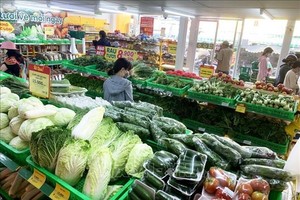According to the data of the Department of Animal Health, the volume of imported meat in the first nine months of this year was 214,400 tons, with 112,700 tons of pork, merely accounting for 3.6 percent of the total domestic pork production. Last year, the country imported 599,000 tons of meat, with 225,500 tons of pork, accounting for 6.4 percent of the domestic pork production.
“As imported pork only accounts for a small proportion of the total domestic pork production, import is not the main reason that makes live pork prices decline over the past time,” the Office of the MARD informed the press.
On the same day, Deputy Minister of Agriculture and Rural Development Phung Duc Tien chaired an online meeting to discuss measures to stabilize the production, processing, and consumption of livestock products.
Deputy Director of the Department of Animal Health Nguyen Van Long affirmed the information that Vietnam imported up to 256,000 tons of pork in the first eight months of this year is not correct. The main reason is that the Covid-19 pandemic broke out widely, causing pork consumption to decrease sharply.
According to Mr. Nguyen Van Trong, Deputy Director of the Department of Livestock Production, due to weakening purchasing power, a backlog of overaged market hogs accounts for 30 percent of the total pig production, or equivalent to 1.5 million pigs, causing live pork prices to fall to below VND30,000-VND35,000 per kilogram. Recently, the prices of live pork have recovered to VND35,000-VND45,000 per kilogram.
At present, pork faces a high inventory, and the prices of poultry products are also at a low level. However, Deputy Minister Phung Duc Tien worried that food prices would rocket again at the end of the year when the demand increases and food supply is scarce.
For instance, Ho Chi Minh City needs 1,600 tons of food daily, but its self-supplied sources can only meet 5-10 percent of the demand. The rest must be provided by provinces in the Mekong Delta. If provinces adopt different regulations on Covid-19 prevention and control, the disruption of the supply chain will recur. Therefore, it is necessary to seek measures to ensure food supply and facilitate the circulation of goods, especially food.
























